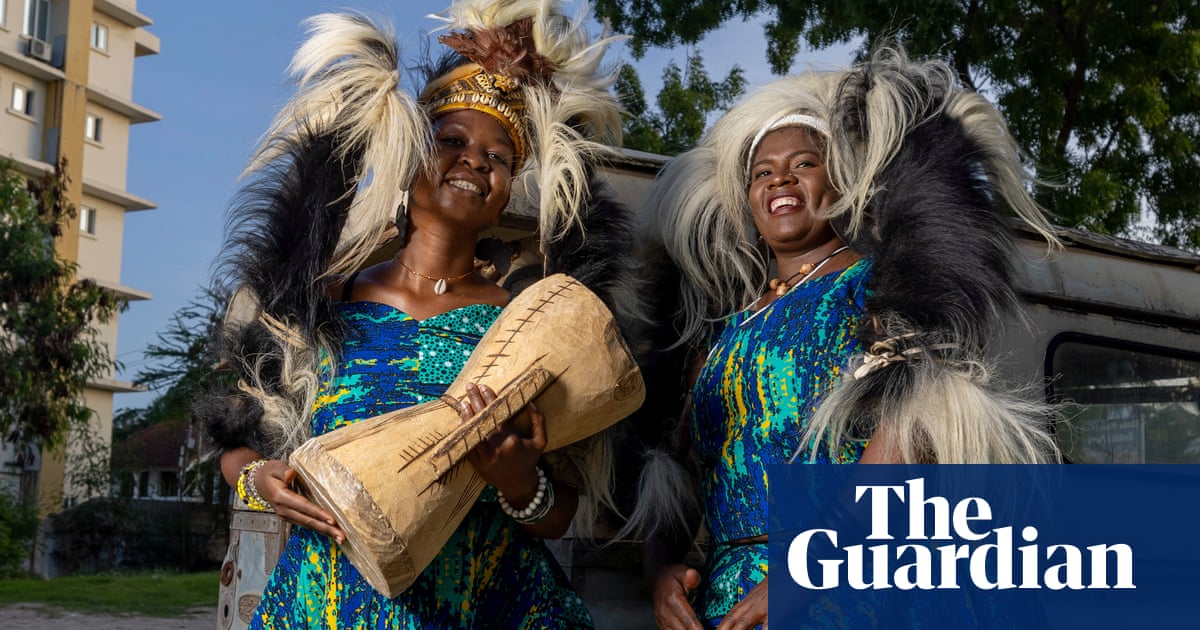Walking into an industrial estate in Peckham, I can hear impassioned cries coming out of a rehearsal space located here. Soaring vocals are punctuated by the gentle strum of a thumb piano along with bells that are strapped to the shaking ankles of Pendo and Leah Zawose, who make up the Zawose Queens. It’s their first time playing this music outside Tanzania – and if that wasn’t enough of a culture shock, some of their first-ever UK gigs will be a trio of sets at Glastonbury this weekend.
“We don’t really have any idea about Glastonbury or what it will be like,” says Pendo, via Aziza Ongala who is the band’s manager and acting as a translator. “But I’m told it’s a big deal. I’m not sure we’re going to be able to grasp how big of an experience it is until we actually do it but we’re very excited.”
The remarkable singing that fills the room has a long history in the Zawose family, with Pendo’s father and Leah’s grandfather Hukwe being a pioneer of Gogo music, which is specific to the tribe they belong to. The vast family – Hukwe had seven wives and 17 children – are all taught this style of percussion-heavy music often made with homemade instruments and rich with vocal polyphonies. Pendo sang and performed with her father, who died in 2003, since she was a child. However, for years her role was limited. “The women were always in the background,” she says. “We would travel and perform with family members but the women have always been sidelined. This is an opportunity to be at the forefront, prove myself, and shine.”
Now singing and playing a range of instruments, the Zawose Queens came to be after a British Council-funded project connecting Tanzanian and British artists put Leah and Pendo together with UK producers Tom Excell and Oli Barton-Wood. They have made an album together, the recently released Maisha. “This record has been something I’ve been dreaming of doing since I was 12,” says Barton-Wood. “I moved to Tanzania for two years, and went to school there, so I’ve always wanted to come back to do a project like this.”
Maisha is rooted in traditional singing and instrumentation, featuring chizeze fiddle along with muheme and ngoma drums but it’s also embellished with more contemporary electronic touches. There are infectious grooves, along with hints of leftfield pop and synth-funk that underpin the flowing polyrhythms and the emphatic polyphonic singing. “This is our heritage, performed our way,” Leah says.
However, it’s not just the embracing of alternative styles that is progressive – the fact it even exists is a bit of a revolution. “What we are doing is very radical,” says Pendo. “We’re the first women in our family to do this and be at the front of our music. We were always discouraged. There are certain instruments that are specifically for men that women are not allowed to touch. So when I was younger, I was told: ‘You’re wasting your time, that’s not a female instrument, stick to your female drum.’ It discouraged me a lot. But doing this has definitely changed our standing within the family.”
Excell says they had to record the album secretly: “They made up some excuse for what they were doing.” It would have been forbidden for them to perform the family’s own music so, for the first time, the pair began to write their own songs. “It was very liberating,” says Pendo. “Because before when we were performing the family music, we were very conscious of making sure we didn’t make mistakes. But writing your own music, we can perform it and sing it however we want. Because it’s actually ours.”
The album was recorded in a variety of places, from a rooftop hotel in Zanzibar where you can hear the churn of the nearby port in the background, while some tracks were recorded live on the beach. “We wanted to include interludes of found sounds and behind-the-scenes snippets,” says Excell. Perhaps the most unique, and poignant, is the sound of Pendo’s baby on the ode to motherhood Sauti Ya Mama, as he was being breastfed while she was performing vocal takes.
The Zawose Queens – who will tour with a full band – also have a special show at Womad festival, where Hukwe used to perform as a trailblazing, yet rare, Tanzanian artist on the bill. “That’s going to be quite a spiritual performance for us,” says Pendo. “It’s like we’re coming full circle and this baton has been passed on.”
As well as being a generational handover, it’s also a gender flip too, which the pair are hoping will trigger even more of the same in the future. “We want to be an example,” says Leah. “There are so many other talented women, including in our family, who just don’t have the opportunity. We want to support them.”

